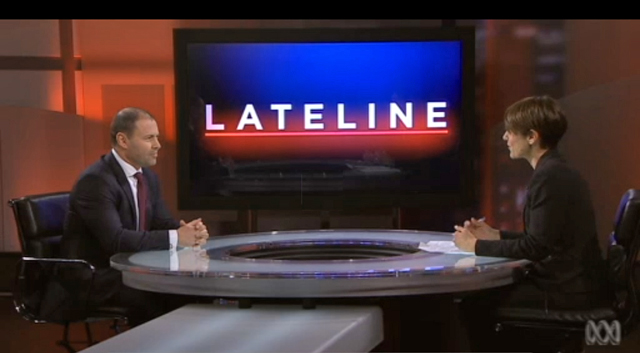There’s an awful lot of misinformation about climate change sloshing around government ranks.

The ABC’s Emma Alberici interviews Josh Frydenberg last week.
“I feel as if my work is done,” said Greg Hunt last month on leaving the climate policy role that over nearly nine years, in opposition and then in government, he made his own.
How he said this with a straight face is beyond me, but it should surprise no-one. The same man accepted without blinking the title of World’s Best Minister in Dubai early this year.
When Tony Abbott became Liberal leader in 2009 Hunt took the job of spinning “Direct Action”, their signature climate policy. It was and still is a political response to an all-too-real problem – a thinly-disguised cover for doing nothing. I’m not sorry to see him go.
Malcolm Turnbull’s cabinet reshuffle saw climate and energy combined for the first time in the one portfolio, which I think was a good decision. Putting coal-power champion Josh Frydenberg in the job may not be, but in this new regime I’m prepared to keep an open mind.
If he’s to understand the perils of burning coal, Frydenberg first has to come to grips with the science of climate change. His performance on ABC’s Lateline last week shows he has work to do.
“I absolutely accept that man is contributing to climate change,” he declared. But that’s not really how it is. Saying we’re contributing to climate change is like saying the sun contributes to a warm day, or Andy Murray contributed to winning the Wimbledon men’s title this year.
In the typically cautious words of the Intergovernmental Panel on Climate Change, there’s a 95 to 100 per cent chance that human activities have been the dominant cause of observed warming since the mid-20th century. We haven’t just contributed to climate change – we’ve caused it.
In the same Lateline interview Frydenberg said Australia’s 2030 target – emissions 26 to 28 per cent lower than in 2005 – was “very ambitious…among the highest in the world [on a per-capita basis]”.
We’ve already heard the same from Abbott, Hunt and Turnbull. All have failed to acknowledge our unhappy record of long being the G20’s highest per-capita emitter, skated over much tougher European targets, and ignored completely the all-important target of zero emissions.
Frydenberg is taking the classic conservative half-way position, allowing the established scientific truth that human emissions affect the climate but dodging the further truth, reinforced by every IPCC report, that their impact is both potent and increasingly dangerous.
He’s playing to the many holdouts in the Coalition who still don’t accept the real and present danger of climate change and the rising urgency to address it. One of their cheerleaders is Frydenberg’s successor in the resources portfolio, Queensland senator Matt Canavan.
Canavan has form as a climate science doubter. A fortnight ago he told Sky News that the impact of carbon emissions had been “overhyped” by “certain interest groups” – in line with an earlier newspaper article in which he advocated funding “scientists who take a different view”.
In that article, published in The Australian in December, Canavan cited a research paper by Hamburg-based climatologist Bjorn Stevens which he claimed showed that a doubling of atmospheric carbon causes warming of “just” 2.2C rather than the IPCC’s upper limit of 4.5C.
Canavan seems to have based his claim on a blog post by an independent scientist who used Stevens’s data to extrapolate his own conclusion. That was picked up by Fox News in a story headlined “New Climate Paper Gives Global Warming Alarmists One Helluva Beating”.
If Canavan had ignored the media hype and contacted the author directly, as others did, he’d have discovered that Stevens disagrees with the extrapolation and wants global warming to be taken more seriously.
Canavan relies for his climate information on “sceptical” bloggers, the kinds of people he thinks should be funded, presumably out of the public purse, to dispute mainstream science. In light of his promotion to cabinet, that’s very disconcerting.
To counter the misinformation that keeps finding its way into government ranks, Josh Frydenberg will need grit, character, motivation and genuine, solid knowledge. Is that too much to ask?
